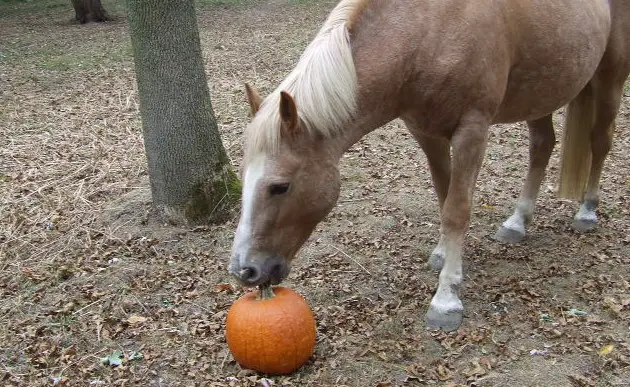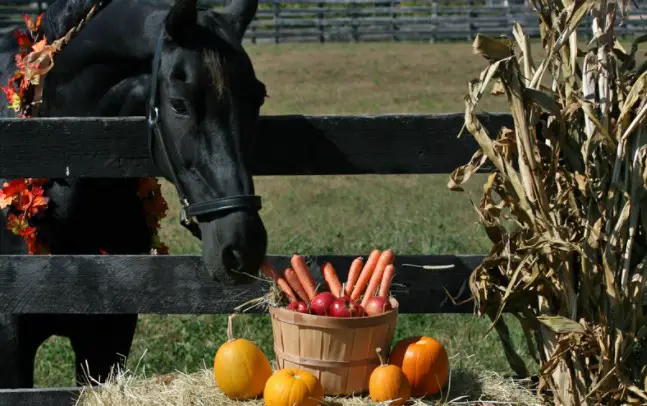You may have an abundance of healthy pumpkins that you want to share with your horse. The problem is, you don’t know if your horse can eat pumpkins.
Don’t fret. Your horse can and should eat pumpkin. Read ahead and find out just how good pumpkins are for your horse. There are loads of health benefits that you will find intriguing.
Trick or Treat! Pumpkins and Your Horse
Pumpkins are a sweet treat for horses. They have a nutritional profile that is harmless to horses. They consist of 90% water and are an excellent way to offer hydration. Do not feed horses decorated pumpkins, the ones that are tossed away after Halloween. Additionally, give your horse fresh pumpkins instead.
Horses Can Eat Pumpkins
Horses love pumpkin flesh. It is sweet but low in sugar. Also, the flesh does not contain fats or carbs that might harm your horse.

Do not worry about peeling the rind when feeding your horse. Horses have strong mouths and can comfortably chew the skin and enjoy it. Moreover, thoroughly wash the rind before feeding your horse. You don’t want your horse to ingest pesticides, dirt, and other germs.
Not all fruit and vegetable seeds are safe for your horse’s consumption, but pumpkin seeds are an exception. The seeds contain nutrients beneficial to your horse. However, pumpkin stalks are a choking hazard. Ensure you remove them before feeding your horse.
Orange pumpkins are the best type for feeding. You can also give them butternut pumpkins, otherwise known as butternut squash. Plus, they are as delicious to horses as they are to humans.
How to Feed Your Horse Pumpkin
Inspect your pumpkin before feeding your horse. Check for mold or any signs of rot. Wash the pumpkin thoroughly and slice it in half. Also, inspect the inside and scoop out any soggy or incredibly soft flesh. If you wish, you can leave the seeds intact.

However, do not feed the pumpkin as it is. Cut it into small pieces to avoid choking hazards. Do not overwhelm your horse with large amounts of pumpkin at one go.
You can leave the seeds raw with other pieces while feeding your horse. If you wish to give the seeds separately, you can take the extra step and toast them. Just remember not to add any salt or spice to the seeds. While it may seem a harmless idea, it isn’t good for your horse.
You can make your horse tasty but healthy treats. The best are pumpkin muffins, pies, and cookies loaded with supplements like oats and fruits. Horses enjoy ‘cheat days’ too! If you are a creative horse keeper, use that creativity in your pumpkin recipes.
Remember the no salt, no spice rule as you get innovative with your pastry. Your horse also does not need additional sugar. Do not add any sugar or icing to add to the taste.
You can also include chopped fruit like apples or bananas in the chopped pumpkin for your horse. A healthy horse fruit salad, why not? Horses can also eat pumpkin puree. First, bake it. Then, mash it. Lastly, add water to your preferred consistency. You can also add a mare’s milk to the mashed pumpkin to feed a foal.
Are you wondering whether your horse can eat canned pumpkins? The answer is yes. Horses can eat organic, store-bought pumpkins. Carefully check the ingredients to ensure they don’t contain chemicals, additives, or preservatives.
Pumpkins’ Health Benefits
Pumpkins have health benefits like vitamin A for eye, bone, cell, and reproductive health. They have a high level of potassium which is a horse energizer—other minerals like calcium and phosphorus boost your horse’s performance.
Pumpkins have fiber that promotes your horse’s digestive health. On the other hand, high water levels also keep your horse hydrated.
Conclusion
Pumpkins are an essential horse diet addition. It supplements the regular hay and greens that constitute your typical horse’s diet. If you plan to add this yummy snack to your horses’ food intake, you can do so once or twice a day.
As you consider introducing pumpkin to your horse’s diet, take it one step at a time. Your horse will need to get used to this new meal. Too much of it may cause digestive disturbances, so proceed in moderation.
